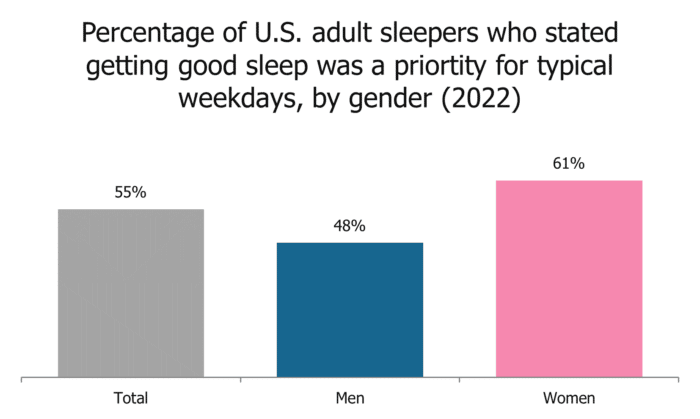Sleep Statistics: Men vs. Women (2022)

Written by: Derek Hales
Published on: October 12, 2022
When it comes to men vs. women, there are big differences in the sleep department. Do men or women get better sleep? More sleep? And what type of sleep problems and challenges impact each gender?
This stats page highlight studies with the following gender-geared statistics.
This analysis includes statistics on the following topics.
- Who prioritizes sleep more?
- Who values a high-quality mattress more?
- Who sleeps deeper?
- Who has more sleep problems?
- Who notes more impact on daily life from lack of sleep?
- Which media activity causes the most sleep loss?
Men vs. Women Sleep Stats (Editor’s Picks)
- Women make quality sleep a higher priority than men. (61% of women compared to only 48% of men)
- Women value a high-quality mattress more than men. (35% of women compared to 25% of men)
- Men are deeper sleepers than women. (26% of women are light sleepers compared to 20% of men)
- Women reported more sleep problems than men. (13% of women have trouble staying asleep compared to just 9% of men)
- Men are less likely to be in a bad mood after poor quality sleep. (56% of women and 42% of men)
- Both men and women are most likely to lose sleep because of watching TV over any other activity.
Women make quality sleep a higher priority than men.
One of the most critical parts of getting quality sleep is choosing to make it a priority. The best-selling author, James Clear, of Atomic Habits, writes this:
All big things come from small beginnings. The seed of every habit is a single, tiny decision.
The difference between the priorities of men and women in shown in the results of the study below.

Source: Statista
According to the study, women are over 20% more likely to make getting good sleep a priority on a typical weekday.
Between men and women, 48% of men make sleep a priority, but 61% of women have the same values.
Women value a high-quality mattress more than men.
So we know that women make getting sleep a priority more than men. One of the most important factors of whether or not you get good quality sleep depends on the type of mattress you have.
Do women value a good mattress in the same way? The answer is yes.
Among men and women, 35% of women said they value a high-quality mattress, while only 25% of men value good mattresses.
In addition, women also place a higher value on a quiet bedroom—44% of women claimed that this was important, but only 35% of men said the same thing.

Source: Statista
Studies show that women make sleep a bigger priority and they value luxuries like a high-quality mattress. One may assume that that would mean women get better sleep. Is that the case?
Surprisingly, the answer is no.
The same study reveals shocking trends between men and women.
Despite having the priority and potentially a better mattress, women continued to get the short end of the stick across the board:
- Who is more likely to wake up tired? Women. 45% of women feel tired in the morning, compared to only 26% of men with the same feeling.
- Who has more trouble sleeping? Women. 32% of men said they do not have trouble sleeping, but only 22% of women could say the same thing.
- Who goes to bed only after midnight? Men. 22% of men and 18% of women.
- Who has trouble unwinding in the evening? Women. 25% of women have trouble unwinding and 13% of men have the same trouble.
- Who needs more naps? Women. 12% of women always need to take a midday nap compared to only 10% of men.
Men are deeper sleepers than women.
Based on findings from the study we can see that men are better sleepers than women. In a comparison between men and women, 20% of men would say they are light sleepers, but 26% of women would classify themselves as light sleepers.
Percentage of U.S. adults who agreed or disagreed that they were a light sleeper, by gender (2019)


Source: Statista
Concerning the quality of sleep, men take the lead, but what about quantity? Between men and women who gets the most sleep?
The answer is a bit of a toss-up, but technically a higher percentage of men get adequate sleep.
According to the Sleep Health Foundation, an adult between 26-64 years of age need between 7-9 hours of sleep per night.
| Hours of Sleep (Per Night) | Men | Women |
|---|---|---|
| 0 hours | 1% | 0% |
| 1-3 hours | 2% | 2% |
| 4-5 hours | 12% | 15% |
| 6 hours | 25% | 24% |
| 7 hours | 27% | 28% |
| 8 hours | 25% | 22% |
| 9 hours | 5% | 6% |
| 10 hours | 2% | 2% |
| 11 hours or more | 1% | 1% |
From the table above, we can see that 60% of men are getting this recommended amount, while 59% of women are achieving the same threshold.
Honestly, the comparison is very close.

When we’re looking just at people getting inadequate levels of sleep, we can see that 17% of women and 15% of men get 5 hours of sleep or less (per night).
Women reported more sleep problems than men.
Despite the similarities in hours of sleep, women continue to report higher levels of sleep problems than men.

Source: Statista
From the chart above, we can see that 17% of women have trouble falling asleep and 29% have trouble staying asleep.
Comparatively, only 12% of men have trouble falling asleep and 28% of men have trouble staying asleep.
Sleepers who struggled with falling asleep and staying asleep included 9% of men and 13% of women.
51% of men report no trouble sleeping, while that number drops to 41% of women that can say the same thing.
Men are less likely to be in a bad mood after poor quality sleep.
So what are the effects of poor quality sleep on aspects of daily life? The effects tend to vary by gender. But the overarching theme shows that women find sleep to have a larger impact on their life than men.

Source: Statista
Women reported sleep having a greater impact on life in every single category that was surveyed.
Without adequate sleep…
- Mood was impacted by 56% of women and 42% of men.
- The work day was impacted by 55% of women and 43% of men.
- General health was impacted by 49% of women and 40% of men.
- Exercise was impacted by 36% of women and 26% of men.
- The ability to have fun was impacted by 35% of women and 26% of men.
- Relationships with family members were impacted by 31% of women and 21% of men.
- Healthy eating was impacted by 28% of women and 17% of men.
Both men and women are most likely to lose sleep from watching TV.
Binge-watching multiple episodes of a TV show or streaming service remains the most common reason why adults in the U.S. are losing sleep. 88% of women and 87% of men confess that night binging is leading to tired mornings.

Source: Statista
Other reasons why sleepers are losing ZZZs include:
- Finishing a book: 71% of women and 61% of men
- Watching sports: 75% of men and 45% of women
- Playing video games: 59% of men and 42% of women
Final Thoughts
The takeaway here shows an interesting dynamic between men, women, and sleep.
Women prioritize the importance of getting a good night’s rest and value a high-quality mattress.
But despite the trends, women continue to report more sleep problems, get less sleep than men, and also suffer the effects of a poor night’s rest stronger than men.
The reason why women can’t seem to catch the good ZZZs likely has underlying causes such as stress, the weight of motherhood, work life balance, and other habitual links. Without question, further studies and research is needed into the sleep differences and challenges between men and women.


